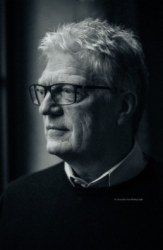4 March 1950 - 21 August 2020.
Obituary by Maria Xanthoudaki, Chair of the Spokes Editorial Committee, Director of Education and of the Centre of Research in Informal Learning, Museo Nazionale della Scienza e della Tecnologia 'Leonardo da Vinci', Milan, Italy
I met Ken Robinson back in 1997 when I was an intern at the Cultural Policy and Action Division of the Council of Europe in Strasbourg. He was the lead expert of an international advisory group in charge of the “Culture, Creativity and the Young” Programme to which I was assigned. The Programme aimed to identify policy priorities for governments to help young people positively and constructively become participants in societal change.
At the time Ken Robinson was Professor of Arts Education at Warwick University, UK and already a leading voice advocating for creativity and individualisation in learning, against the conformity, compliance and standardisation of school systems; but he was not yet the internationally-known voice he became later on, urging educators across the globe to pause and think what is the education we really need, and want.
I have followed his work ever since- his move to the US to become senior adviser to the J. Paul Getty Trust in Los Angeles, his books and talks, until the latest initiatives he led or joined - the podcast series “Learning from Home” and two brand new platforms: hellogenius.com, a safe online learning environment for children to discover their passions and goboundless.org, a platform for educators to work together - just two months ago. Everything he did and argued for embraced the principles of learning ecology, diversity, human potential and the valuing of individual skills and passions and, more recently, the environmental movement and the need to act for the climate crisis.
Ken Robinson was also a superstar. Not so much because he became the first contemporary name that comes to mind when we talk about the value of creativity in education, nor because his TED talks have been watched millions of times (the 2006 TED talk “Do schools kill creativity?” on its own has been watched over 66 million times), but for his fearless ideas and his powerful advocacy, for the way he was able to capture you and hold you there, unable to stop listening to him fighting for what really matters in learning; for his confidence in allowing wit and irony to become part of a very serious argument; for the way he was able to gather millions of educators around one goal: that of a personalised approach to learning.
The announcement of his death through social media on 22 August arrived so suddenly and is so hard to believe. He will be missed. Of course, his work will continue to inspire and teach but, as with every superstar, his followers would have preferred - would need - to have him continue being active on stage.
Official website https://sirkenrobinson.com

